SEO vs. PPC: Which Healthcare Marketing Strategy Should You Choose?
Posted on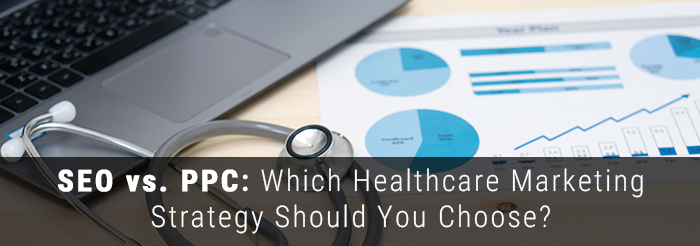
Are you a healthcare marketer who is launching a digital marketing campaign and wants results? Are you also hoping that the time and money you are putting in will attract a large volume of targeted traffic to your website, all ready to convert? In other words, you are hoping for a solid ROI.
While there are scores of different avenues you can take, it boils down to one of two strategies: search engine optimization (SEO) or pay-per-click (PPC). Both strategies are tried-and-tested and will drive targeted leads to your website. But which strategy makes the most sense for your unique needs? And if you want to invest in both strategies, which one should you focus on more?
Deciding where your marketing dollars should go is a tough decision for most healthcare marketers, and the decision between PPC and SEO is burdened with doubt about which is the better strategy. Is one strategy more effective than the other? Could you focus on both?
If you have had a healthcare website for a while, then the chances are you have already experimented with at least one of these two strategies, if not both. Or maybe you choose SEO first, and now you are questioning if you have made the right choice, or if PPC would have been more beneficial. Or perhaps you are keen to know more useful and cost-effective ways to drive traffic to your website. Whatever the case, we are here to help you tackle the question head-on and offer some insight.
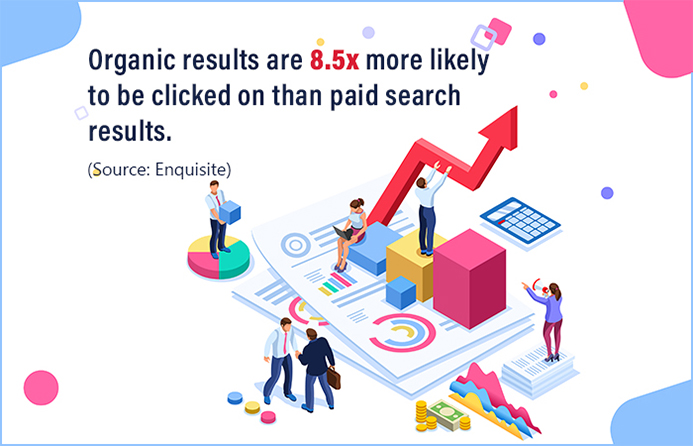

Ask any healthcare marketing expert about SEO vs. PPC, and you will come across a whole range of answers and explanations from people on both sides. Some experts swear by SEO while others prefer to use PPC to generate traffic. So, which strategy is most effective?
PPC and SEO: An Overview
Both of these strategies will work to promote your practice and improve your brand visibility.
SEO is all about acquiring higher organic search rankings for targeted keywords on the majority of search engines. PPC, on the other hand, is all about paying for an advertising slot or space that is targeted for specific keywords on search results pages. Both strategies are equally critical in helping you acquire relevant traffic for your website.
And if you plan and carry out your campaigns correctly, you will attract more than the expected number of qualified leads, and a reasonable percentage of those leads will easily convert. So while the outcome is more or less the same, the way you get there is different, depending on the course you take.
Why is SEO preferred over PPC?
Perhaps the biggest reason healthcare marketers choose SEO over PPC is due to its cost-effectiveness.

You will pay a lot more to attract the same volume of traffic with PPC than with SEO, especially if you are doing it in-house. It takes a sizable chunk of your marketing budget to get a PPC campaign up and running. In addition, if you are new to the digital marketing game, you may have to deal with the learning curve, which means it may take a while to get your ROI to where you want it to be.
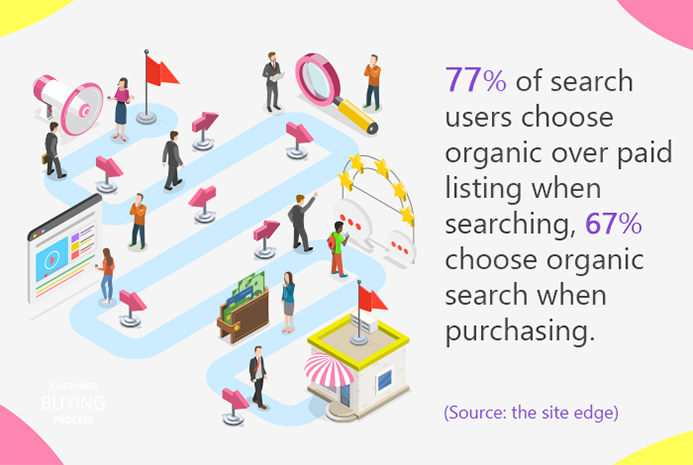
SEO is comparatively cheaper and involves time investment instead of financial investment. So if your marketing budget is limited, SEO may be your best bet. One of the biggest benefits of SEO is the sustained, long-term results that healthcare marketers tend to get. However, remember that SEO starts slowly initially, but it grows tremendously over time. This aspect makes SEO more sustainable than PPC, resulting in high-quality and more relevant organic traffic to your website for years to come. The best, but not the last, benefit of SEO is that most healthcare marketers notice a higher ROI with SEO.
Just think about it: Every click you get through PPC comes at a price. The only way to attract more traffic to your website is to pay for it. This aspect will inevitably diminish your ROI. But with SEO, it is pretty much direct profit. This is because when you acquire traffic organically, the returns are more significant. Even when you take your foot off the pedal, you will continue to drive traffic to your website. This means eventually you could be driving free traffic to your website.
Pitfalls of PPC
The biggest downside of PPC is that it comes with higher upfront costs. And the costs are increasing. As more and more digital marketers compete for website traffic, platforms are raising their prices. For instance, the competition at Google AdWords is cutthroat.
Some digital marketers are also of the view that the money spent to acquire paid traffic sometimes outweighs the amount gained through sales. So if you are a new medical practice with a limited budget, PPC may not be the best option for you from the cost perspective.

In addition to higher cost, optimizing your ads to reduce your cost per click (CPC) and increasing your click-through rate (CTR) can be a challenge. Do not be under the impression that you can just put some ads on a PPC platform and get a high volume of targeted traffic overnight. It is an arduous process even for experienced digital marketers.
And the real downer is: Despite spending all this money and time learning the tricks of the trade, your website traffic will cease when your campaign ends. The moment you stop directing money into your PPC campaigns, your website attracts zero traffic.
While other digital marketing tactics, including SEO, require maintenance and knowledge, they still drive traffic to your website even if you pause your campaigns. Unfortunately, this is not the case with PPC campaigns. In order to maintain your traffic, you have to continually “fan the fire” and invest money into your campaigns.
SEO, too, has downsides!
To be honest, it is not all rainbows and cakes and roses all the time.
One of the biggest challenges healthcare marketers have with SEO is the constant change in search engine algorithms. Over the years, major updates have caused serious disturbances to the search engine results pages (SERPs), and a lot of healthcare marketers had to go through the negative impact.

This means SEO is not a “set it and forget it” kind of strategy. It requires a lot of knowledge and maintenance, and it is important to stay updated on algorithms.
Another downside of SEO is penalties. Just the thought of a penalty can make any SEO marketer squirm. The best way to keep your website safe from any penalty is to follow ethical and white-hat techniques. Emphasize creating excellent-quality content, stay up-to-date on SEO trends and algorithm updates, and in no time you will be reaping the benefits of one of the best and most effective digital marketing strategies.
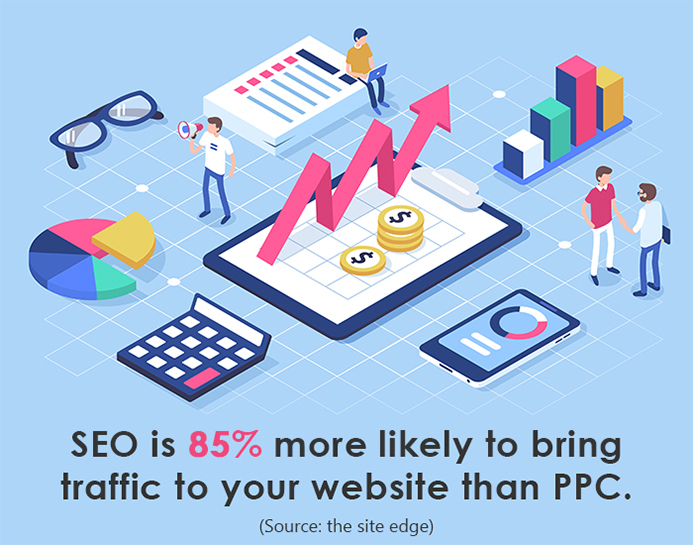
But it takes time to see SEO results. If patience is not one of your key strengths, you may find the SEO process frustrating. It is not a strategy that will deliver instant results or success overnight. This is because getting a search engine to index your web content may take a lot of time. Even for experts, it is difficult to pinpoint how long it may take for the search engines to take notice of your content, but usually, it takes a few weeks to index content on major search engines. Not just this, but it may take months before you notice any real impact. So if you want to thrive with SEO, you’d better be in it for the long haul.
Conclusion
Both strategies can get results, but they help you achieve your goals by two different techniques.
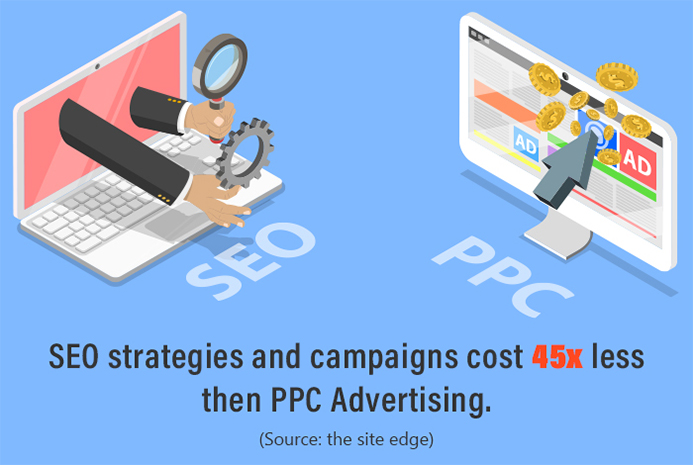
With SEO, it is about planting a seed and then patiently waiting for the fruit. It may take a while, but your brand will be positioned the way you always hoped once you gain good rankings in the SERPs.
PPC is instant gratification. It requires a larger investment, but the results are almost instant. You can go from being a no brand name to a known brand name overnight. But it will cost you. And this success may not be permanent or sustainable like SEO.
We wish we could decide for you which tactic is the better-suited for your unique needs. But sometimes there are no right or wrong answers. Choosing which strategy to focus on depends on several factors and the goals you have for your medical practice.
However, looking at the pros and cons should give you a good idea of what is better for your medical practice.

 Why Good communication Matters in Healthcare
Why Good communication Matters in Healthcare De-Escalation Tips for Handling Aggressive Patient..
De-Escalation Tips for Handling Aggressive Patient.. Reaching The Right Audience Through Target Marketi..
Reaching The Right Audience Through Target Marketi..